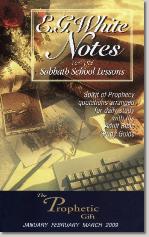|
||||||||||||||||||||
Commentary on "Confidence in the Prophetic Gift"
Day 2: Sunday, March 22, 2009
The lesson asks: “What parallels do you see between the experience of the disciples after the Crucifixion and the early Advent believers after the Great Disappointment in 1844? Luke 24:13-27; Acts 10:9-16, 44-48.”
This is a case of apples and oranges; there is no parallel. The disciples’ disappointment after the crucifixion was a result of not understanding the true prophecies of the Messiah in the Old Testament.
The Great Disappointment in 1844 was simply the failure of a false prophecy which the Bible clearly warns against in Matthew 24.
The lesson says: “Read Acts 1:6. What does this say about how, even after Jesus was with them after the Resurrection, they still were carrying false ideas about what His coming meant?”
“So when they had come together, they were asking Him, saying, "Lord, is it at this time You are restoring the kingdom to Israel?"” Acts 1:6 (NASB)
This passage cannot be honestly used to support “The Great Disappointment” of 1844. Not one of Jesus’ disciples had made a mistaken prophecy concerning His return. Jesus had clearly prohibited this. In fact, if the context of this passage was observed, it would be understood that Jesus would never reveal dates such as 1844: “He said to them ‘it is not for you to know times or epochs which the Father has set by His own authority’” (Acts 1:7). The disciples were simply asking the Lord if he was going to immediately be establishing His kingdom on the earth (Acts 1:8).
The Jews being the chosen people of God always thought that would bring them world dominion. Their eyes were fixed on the world and not eternity while Jesus spoke of God’s eternal kingdom. The whole purpose of Jesus’ death and resurrection was to provide those that repent from their sin and trust in Him to forever be free from the oppression of sin and the sentence of spiritual death in hell that came with it. The disciples were looking for a life free from oppression and dominance from foreign nations such as Rome.
Summary
- There is no parallel between the disciples disappointment after the crucifixion and the “early Adventist believers”.
- The disciples had not understood the Bible’s prophecies of the Messiah. The Great Disappointment was simply the failure of a false prophecy.
- Acts 1:6 does not support The Great Disappointment of 1844. The Jews’ eyes were fixed on the world while Jesus spoke of God’s eternal kingdom.
- The purpose of Jesus’ death and resurrection was to forever free those who trust Him from the oppression of sin and the sentence of hell. The disciples were looking for a life free from the dominance of Rome.
Copyright 2009 BibleStudiesForAdventists.com. All rights reserved. Revised March 21, 2009. This website is published by Life Assurance Ministries, Glendale, Arizona, USA, the publisher of Proclamation! Magazine. Contact email: BibleStudiesForAdventists@gmail.com.


The Sabbath School Bible Study Guide and the corresponding E.G. White Notes are published by Pacific Press Publishing Association, which is owned and operated by the Seventh-day Adventist church. The current quarter's editions are pictured above.
Official Adventist Resources
Standard Edition Study Guide Week 13
Teacher's Edition Study Guide Week 13
Easy Reading Edition Study Guide Week 13
Search the Complete Published Ellen G. White Writings
